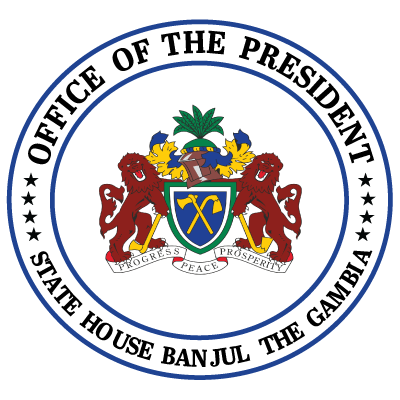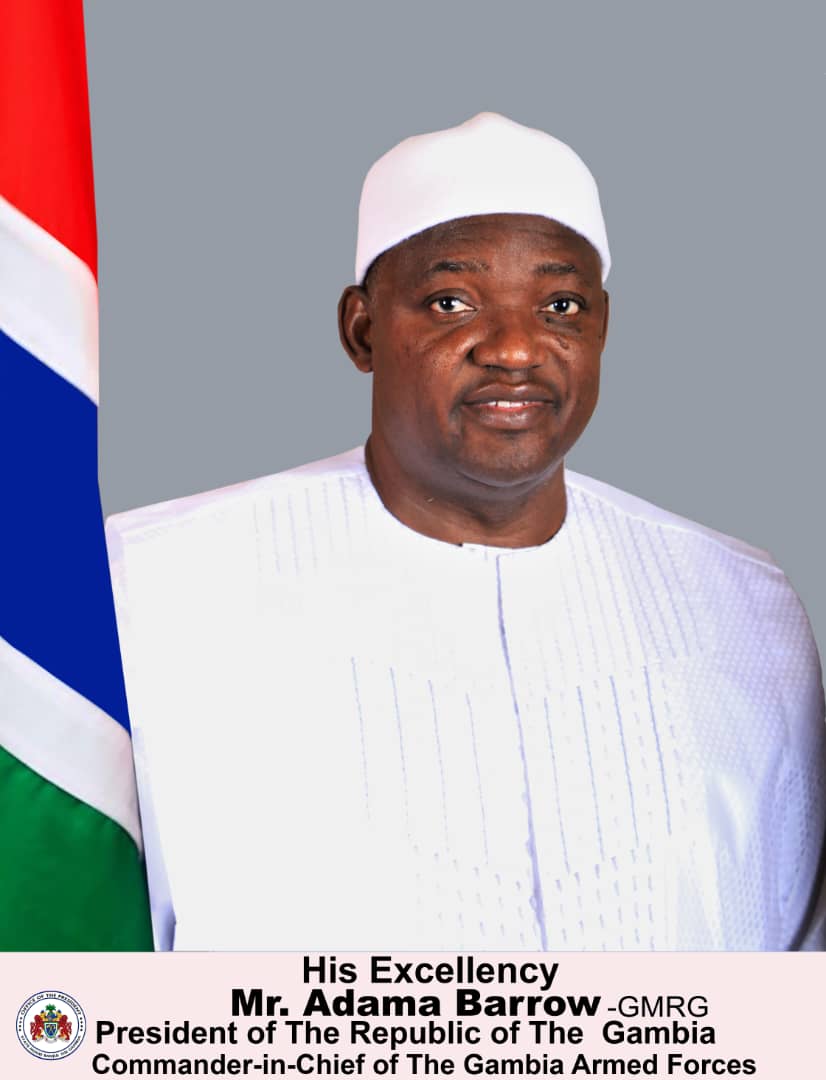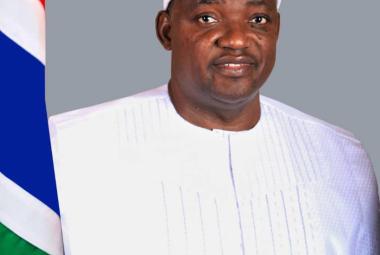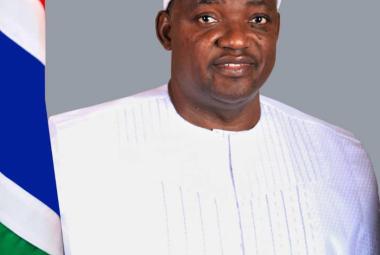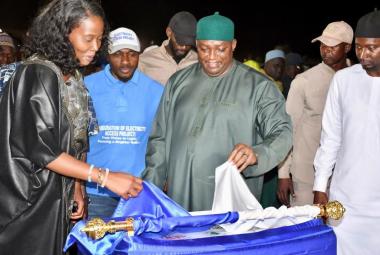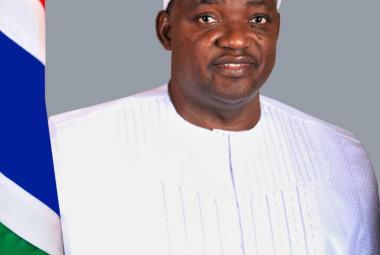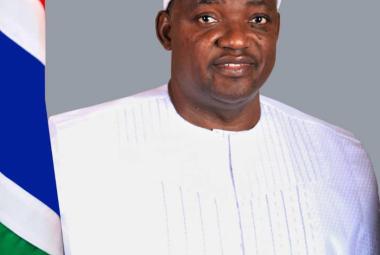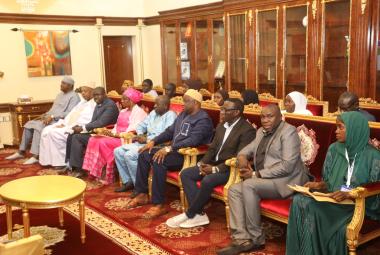21st June 2025 | Convocation Grounds
Chairman, Sir,
With your kind permission, I invite His Excellency Mr. Adama Barrow, President of the Republic of The Gambia, to graciously come forward and remain upstanding as the University of Applied Science, Engineering and Technology delivers this citation in his honour. We gather today not merely to celebrate a man, but to salute a symbol of perseverance, reform, and national transformation; a man whose life affirms Shakespeare’s dictum that “some are born great, some achieve greatness, and some have greatness thrust upon them.”
Born on the 15th of February, 1965 in the quiet village of Mankamang Kunda, Adama Barrow’s story begins in the rural heart of The Gambia far from the polished halls of state but deeply rooted in the soil of humility, dignity, and communal duty. Educated through public schools—St. George’s in Basse, Crab Island in Banjul, and Muslim High he matured through hard work, not privilege, and rose not on the wings of fortune but through grit and endurance. His early career in commerce sharpened his instincts, and his sojourn in the United Kingdom expanded his horizon, preparing him for a journey few could foresee.
When he returned to The Gambia and founded Majum Real Estate in 2006, his vision was clear: to democratize land access, to build, and to empower. It was an engineer’s dream with a statesman’s conscience brick by brick, lot by lot, he laid the foundations not only for homes, but for hope. Unbeknownst to many, the blueprint of the future president was already taking shape.
It was in the realm of politics, however, that his destiny would truly unfold. First contesting parliamentary elections in 2007, he bore defeat with grace and grew in resolve. By 2016, he emerged quietly, courageously as the standard bearer of a historic coalition, facing down a two-decade incumbent. When the people spoke on the 1st of December 2016, they chose not merely a man, but a moment a new dawn. And when a constitutional crisis ensued, he stood firm but peaceful. Sworn in on Senegalese soil and returning in triumph to Gambian soil, his restraint averted bloodshed and earned him a place in the pantheon of Africa’s democratic peacemakers. In the words of Victor Hugo, “There is nothing more powerful than an idea whose time has come.” President Barrow was that idea made flesh.
As President, he has redefined the architecture of national development. Under his leadership, The Gambia has witnessed a quiet but seismic transformation a shift not only in form but in foundation. The towering Senegambia Bridge, completed in 2019, is more than a structure; it is a triumph of engineering diplomacy, linking not just two coasts, but a region, a people, and a purpose. Urban renewal projects, such as the Banjul Rehabilitation Programme, have revived the capital’s lungs roads, drainage, lighting, and sewage restored and reimagined under his vision. In every province, feeder roads now weave through fields and villages like arteries of inclusion, and solar-powered electrification schemes have begun to lift darkness, quite literally, from rural communities.
His commitment to engineering as a driver of dignity is evident across sectors: in health, he oversaw the construction of regional hospitals and health centres; in agriculture, he restored mixed farming centres to productivity; in energy, he expanded electricity coverage from 42% in 2016 to over 60% by 2024, marking a steady march toward universal access. His administration secured US$1.7 billion in pledges for The Gambia's National Development Plan (2018–2021), galvanizing infrastructure, education, and public service delivery into a harmonized system of national upliftment. Like the builders of ancient cathedrals, he understands that the work of a generation often serves the next.
More than builder of bridges and roads, President Barrow is a builder of institutions. He presided over the establishment of the Truth, Reconciliation and Reparations Commission (TRRC), the National Human Rights Commission (NHRC), and the Constitutional Review Commission (CRC). These are no hollow constructs but strongholds of democratic architecture designed to endure beyond his tenure. His reform of fiscal systems the creation of a Single Treasury Account, a historic reduction of the presidential budget, and laws for anti-corruption reflect not just policy, but principle. As the Roman philosopher Seneca said, “A great man is he who places virtue before ambition.”
In the area of media and civil liberties, his tenure has seen the licensing of over 37 private and community radio stations and several television channels liberalizing the airwaves and empowering the voices of the people. No Gambian journalist is today in prison for doing their job. A free press, long suppressed, now breathes again.
Internationally, he has carried Gambia’s banner with honour. From ECOWAS summits to the African Union, from the United Nations General Assembly to bilateral engagements in Asia and the Gulf, President Barrow has projected a vision of The Gambia as a nation of peace, purpose, and partnership. He has received numerous distinctions, including the Africa Road Builders Award, the Grand Commander of the Republic of Sierra Leone, and honorary doctorates from universities in India and The Gambia. These honours are the external validation of what Gambians have long known: that their leader is both symbol and servant.
His record in advancing gender equity is equally commendable. Women under his administration have held the posts of Vice President, Ministers of Agriculture and Trade, and heads of key public institutions. The establishment of the Ministry of Women, Children and Social Welfare reflects a structural commitment to gender justice. In youth empowerment, his focus on TVET institutions, entrepreneurship programmes, and digital literacy is preparing the next generation not only to inherit the future, but to invent it.
A polyglot and bridge-builder, fluent in English, Mandinka, Wolof, Fula, and Sarahuleh, he embodies the unity-in-diversity that is The Gambia’s strength. He is a husband, a father, a football lover and a man whose life speaks not in bombast but in quiet triumphs. He once said, “Leadership is not about a crown on the head; it’s about a burden on the shoulders.” And truly, he has borne that burden with patience, perseverance, and purpose.
Chairman, Sir, it is therefore with profound honour, and on behalf of the Senate and Council of this great university, that I present to you His Excellency Mr. Adama Barrow for the conferment of the honorary degree of Doctor of Engineering and Technology (Honoris Causa) by the University of Applied Science, Engineering and Technology.
In him, we honour not only a man of action, but a man of conscience, a leader who proves, in the spirit of Shakespeare, that “to do a great right, do a little wrong” need not apply when greatness is married to grace.
May his story inspire not only those who build with brick and mortar, but also those who build with courage and vision the engineers of a freer, fairer, and more sustainable Gambia.
